
Bob had just made contact with the shoulder-surfing thief…
Pirouetting, I went to find Kun Chang, our film director, who’d been with us all day, along with his crew. When we’d given chase to our quarry, they’d followed our progress from a distance, eventually taking up a static, central position. Now I stood with Kun & Co. just long enough to get my little video camera turned on, amazed to see Bob and the purse-dip still together.
I went to join them, instantly lowering Bob’s perceived threat, from the thief’s point of view. No longer was it one mysteriously-motivated man against a criminal—it was just a couple! A harmless, curious couple. We moved out of the traffic and huddled next to a vending machine.
The man did not deny his occupation. He did not bolt. He did not raise a fist or deliver a swift kick or practice whatever form of aggression he’s known for. He answered our questions in soft-spoken Arabic-tinged French and repeatedly asked one of his own: Why? Why do you want to know these things?
Our French-speaking film director, Kun Chang, soon joined us, raising the level of our conversation from Bob’s basic French. I glanced down at my camera, a tiny thing the size of my little finger. Packed into its small body are a battery, a chip that stores hours of sound and video, an unnoticeable lens, and a few switches. Gone are the cumbersome wires, remotes, antennas, transmitters, and external storage devices we wrangled while using our old hidden cameras. But this one lacks a viewing device or monitor, and I wasn’t familiar with its capturing angle, or anything else about it.

Glancing down, I was horrified to see a flashing red light. This is one of the first things I usually disable when thiefhunting. You may as well display a giant neon sign: “I’m recording!” I covered the light with my finger, immobilizing my left hand for the remainder of the encounter.
Bob: “I’m a pickpocket too, like you. For the last 20 minutes, I’ve watched your technique. I can see you’re very experienced.” Bob does the butter-up.
Thief: “You’re probably better than I am.” Touché.
Bob: “I’m very good on stage.” (And modest, an Italian thief once chided.)
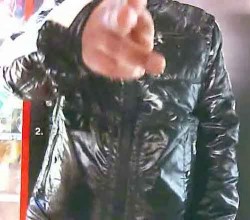
Bob, afraid our detainee would soon scoot, suggested coffee together, or dinner. “I need to work, I can’t stop to have dinner with you,” he said. “And beside, I don’t want to be on TV. I can see you’re filming me right now.” He jabbed a finger toward my camera.
Cooly, I pretended not to hear that.
We learned that our man considers himself best at stealing from handbags and backpacks. It’s best to do it when the person is moving, in motion, he explained, and you have to concentrate on the person while you’re doing it. Puffing up a little, he invited us to follow him and watch.

I suddenly noticed how much fringe from my scarf was falling in front of the camera. I swept it away. But maybe that was why the thief had seemed to forget about it. I wondered what kind of image I was getting. And what about sound? Was my finger over the microphone? I didn’t know.
The thief told us that he doesn’t know how to work in a gang, he never has. And he said stealing is a hundred times more difficult on the street, as compared to the stage. Bob agreed, though he believes otherwise. When a criminal fails, he walks away and tries again. When a stage pickpocket fails, he has hundreds or thousands of witnesses, and a reputation dependent on success.
Throughout, the man stood calmly, gesturing rarely, jacket zipped to his chin. Built like a flyweight boxer, exuding confidence and arrogance, he seemed in no hurry to leave us, despite his professed need to work. (We actually see this behavior often: thieves seem to enjoy an opportunity to brag, to tell their sob stories, to talk to someone willing to listen.)
The pickpocket explained the importance of getting the cardholder-victim’s PIN, and that he had no trouble memorizing the four digits. He said he uses the credit cards himself, he never sells them to others. Then he dropped the bombshell—to me, the most interesting revelation:
He doesn’t steal money—only credit cards. He never takes people’s cash because it’s not insured. What he steals from their credit cards, they get back from the bank.
Really? A thief with a heart?
Bob begged again for a dinner together, or another meeting. The thief said sure, maybe tomorrow, and took our phone number. He made sure we had his name spelled correctly, and suggested some possible times. Shaking hands all around, he turned and slipped into the turbulent crowd. Back to work.
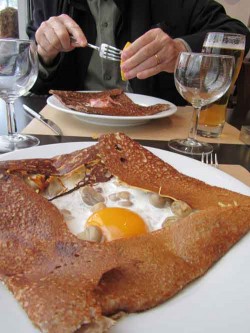
* * *
Did we go to the Eiffel Tower, you wonder? Did we visit Notre Dame, or the Louvre? No, no time for any of that this time. But we did eat well.

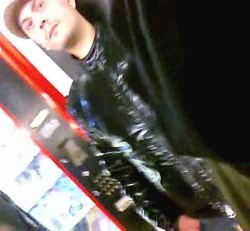
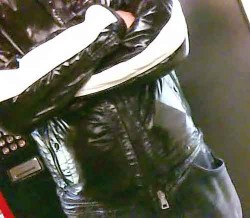
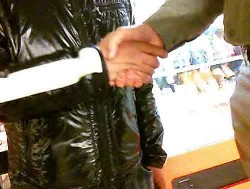




2 Comments
I wouldn’t be so sure that the credit card company will cover the loss for what the thief spends. Chip-and-pin was introduced in the U.K. in 2004, and one of the biggest criticisms of it was that for more than five years, until a law was passed that became effective in November 2009, banks would require customers to prove that they had acted “with reasonable care” to protect their PIN and card. This being rather difficult to prove, most customers would be stuck footing the bill.
[…] Or not… Part 2 […]